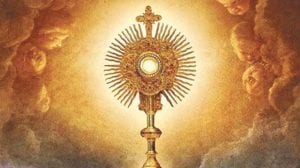
The Feeding of the 5,000 is recorded in the four Gospels:
- Matthew 14:13-21
- Mark 6:30-44
- Luke 9:10-17
- John 6:1-15
Although the feeding of the 5,000 is found in all four Gospels, only John’s account details Jesus telling His disciples to gather up the left-over fragments: “And when they had eaten their fill, he told his disciples, ‘Gather up the fragments left over, that nothing may be lost.’ So, they gathered them up and filled twelve baskets with fragments from the five barley loaves, left by those who had eaten.” (John 6:12-13) The Gospel of John tells us specifically that the fragments in the twelve baskets were indeed leftovers from the five barley loaves.
Point 1: John’s Gospel tells us that the feeding of the 5,000 was a miracle of multiplication and not a miracle of sharing. This is not to say that one miracle is greater than another, but it says that Jesus indeed performed the miracle of multiplying the 5 loaves and 2 fish in order to feed the multitude.
Point Two: The Feeding of the 5,000 prefigures the Eucharistic Celebration
- The Eucharist is spiritual food. In the feeding of the 5,000 the people were fed with earthly food – bread and wine, but in the Eucharist, the people are fed with food for the soul – which is nothing less than the Body and Blood of Christ.
- The Eucharistic Celebration is a banquet for multitudes. The millions of people who come to Mass and receive the Eucharist all over the world are the multitudes who are fed with the Body and Blood of Christ.
Point Three: Solemnity of Corpus Christi
St. Juliana of Mont Cornillon aka St. Juliana of Liège had a vision of Christ. Christ revealed to St. Juliana that He wanted a feast day to celebrate His most holy Body and Blood. There are 3 reasons as to why Christ wanted this feast day:
- To preserve faith in the real presence
- To strengthen the faithful on their path to virtue
- To make reparation for blasphemies and sacrileges against the Eucharist
To preserve faith in the real presence – do you believe that the Eucharist is truly the Body, Blood, Soul and Divinity of Jesus Christ?
To strengthen the faithful on their path to virtue – do you worthily receive the Eucharist frequently in order to strengthen your spirit and soul in virtue?
To make reparation for blasphemies and sacrileges against the Eucharist – do you do penance out of love for God, for the conversion of sinners, and in reparation for the sins committed in the world against God?